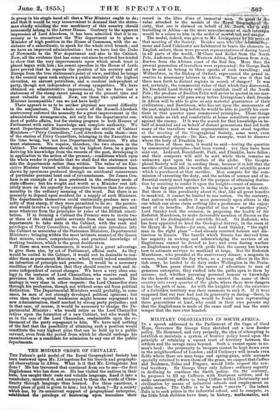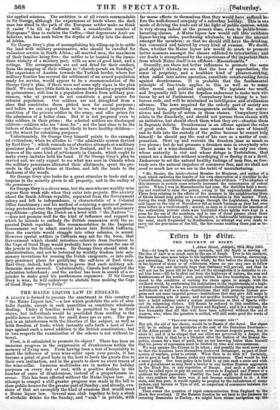MILITARY COLONIZATION IN SO.UTH AFRICA.
IN a speech addressed to the Parliament of the Cape of Good Hope, Governor Sir George Grey sketched out a new Border policy. He dismissed, and very properly, the idea of attempting to establish or maintain a system of frontier policy based upon the principle of retaining a vacant tract of territory between the settlers and the savage races beyond. Such a vacant awe is no- man's land : the propensity to trespass cannot be kept down even in the neighbourhood of London ; and if Cockneys will invade even fields where there are man-traps and spring-guns, with servants specially retained to warn them off the grass' we suspect that Caffres and Bushmen, Zulus and Firigoes, would little respect the neu- tral territory. Sir George Grey only follows ordinary sagacity in declining to continue the Smith policy. On the contrary, he proposes to fill up Caffraria with European settlers, and to make unremitting efforts to bring Caffres within Christianity and civilization by means of industrial schools and employment on publics works. The Caffre is to be made " navvie ' ; the infant Zulu is to seek prizes in the industrial school, and to compete, as the little Irish children have done, in history, mathemataes, and
the applied sciences. The ambition is at all events commendable in Sir George, although the experiences of lands where the dark man has stood in the path of the European settler make us think it easier "to fill up Caffraria with a considerable number of Europeans" than to reclaim the Caffre,—that degenerate Arab un- believer, who has sunk below the depths of Araby into the desert of Africa.
Sir George Grey's plan of accomplishing his filling-up is to settle the land with military pensionaries, who should be enrolled for volunteer service in South Africa; all married men, the maximum of their families being five ; the settler to be located in the imme- diate vicinity of a military post, with an acre of good land, and a cottage. The arrangements are cut and dried for their conduct, from the mapping of their village to "church-parade on Sundays." The experience of Austria towards the Turkish border, where her military frontier has secured the settlement of an armed population
ready for service, would appear to be a recommendation of Sir George Grey's plan, if there were not some ugly signs in the plan
itself. We can have little faith in a scheme for planting a population in quincunxes ; still less in a population drawn from military pen- sioners, who at present do not constitute a good source for colonial population. Our soldiers are not draughted from a class that constitutes them picked men for social purposes ; and before we can expect them to be so, we must improve the condition of the private soldier in the army, and offer prizes for the admission of a better class. But it is not proposed even to take soldiers in their prime : the selected settlers are discharged soldiers—soldiers who are "done for " ; not the best class to be the fathers of families—not the most likely to have healthy children— not the wisest for colonizing purposes.
Unfortunately, Sir George Grey himself points to the example ad evitandum, when he alludes to "the admirable system devised by Earl Grey " ; which reminds us of abortive attempts at a military
pensioner plan of settlement in New Zealand, and to those expe- riences of the same kind of settlements in Canada, which ought to make every imitator hold his hand. If Sir George Grey's plan be carried out, we only expect to see what was seen in Canada when the military pensioners alienated their allotments, spent the pro- ceeds in the public house at Quebec, and left the lands to the darkness of the woods.
Sir George Grey also looks for a great stimulus to trade and en- terprise in the security given to all property, and in the outlay of the pensioners /
Sir George Grey is a clever man, but the men who are worldly-wise expose their weak side when they enter into projects. His anxiety
about the South African republic, separated from the Government colony and left to independence, is characteristic of a Colonial Office functionary ; and his method of retaining a species of patron-
izing protection over the republics by teasing them with missionary expeditions—placing the Dutch on a level with " the Natives "- -does not promise well for the kind of influence and support in which he intends to embody the British connexion with the se- parated Dutch republics. His recommendation to the Imperial Government not to admit convict labour into British Caffraria, since the convicts would straggle into other colonies, is sound. However special settlers in Caffraria may ask for the boon, that Government which should introduce colonists from Dartmoor to
the Cape of Good Hope would probably have to account for one of the jewels in the British crown. Sir George Grey should stick to administration, and not be betrayed by worldly wisdom into mis- sionary inventions for rousing the Dutch emigrants, or into mili- tary-pensioner plans for gratifying the self-love of Earl Grey. Earl Grey, indeed, hath written to prove that such military set- tlements must succeed. Unfortunately, Canada had supplied the refutation beforehand; and the author has been in search of a re- joinder to make good his posthumous argument. If Sir George Grey is wise, he will endeavour to abstain from making the Cape of Good Hope "Grey's Folly."



























 Previous page
Previous page